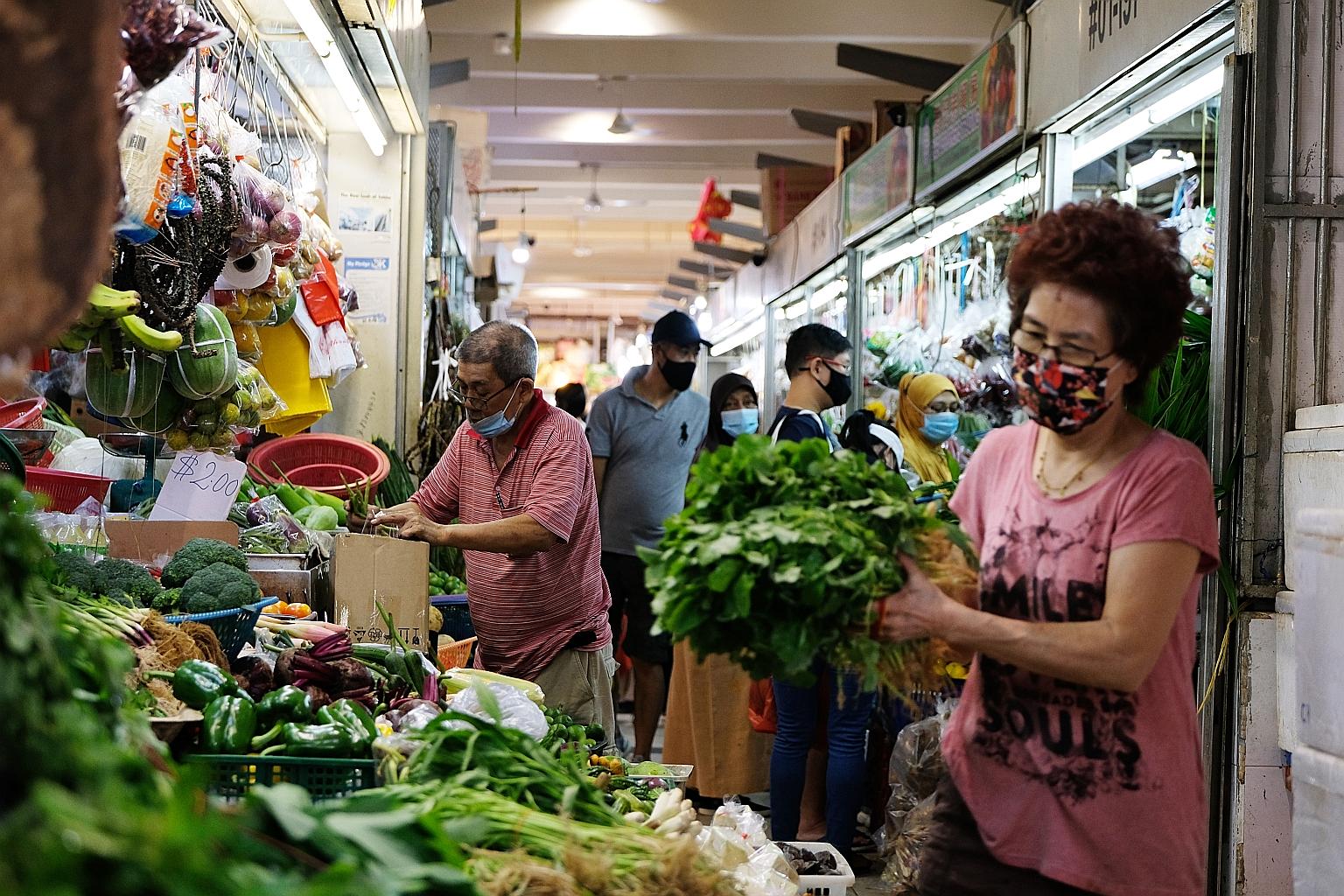Vegetable prices jump amid supply disruption
Sellers say this is due to wet weather and tighter Covid -19 curbs in Malaysia
Sign up now: Get ST's newsletters delivered to your inbox

While wet market prices of some vegetables have gone up, both FairPrice and Sheng Siong say their prices have not been affected.
PHOTO: LIANHE ZAOBAO
Yeo Shu Hui, Deepa Sundar, Baey Zo-Er, Cha Hae Won
Follow topic:
Wet weather in Malaysia has affected the supply of some vegetables to Singapore, causing their prices to soar at some wet markets.
The price of tomatoes was the hardest hit, doubling to up to $3 per kilogram at some vegetable stalls, The Straits Times found during visits to nine wet markets over the past week.
The prices of cabbage and lettuce - mostly supplied by Malaysian farms - had also gone up.
Many vegetable sellers attributed the increase in prices to wet weather in Malaysia, which affected supply. Others cited tightened Covid-19 curbs and screenings, and the lockdown in Malaysia from June 1.
The nine markets visited were Teck Whye Market, Fajar Market, Bukit Gombak Wet Market, Tekka Market, Teck Ghee Court Market and Food Centre, Ghim Moh Wet Market, Toa Payoh West Market and Food Centre, Chinatown Complex Market and Food Centre, and Clementi 448 Market and Food Centre.
At $3 per kg, tomatoes were the most expensive at Teck Whye Market. Before June 1, when Malaysia went into lockdown to curb rising Covid-19 infections, they were selling for $1 to $1.50 per kg.
Teck Whye Market was also the most expensive for cabbage at $5 per kg, up from $3.50 before.
At Clementi 448 Market and Food Centre, the price of tomatoes doubled to $2 per kg. Cabbage was going for $2.10 per kg, up from $1 before June 1.
At Fajar Market, cabbage was selling for $2.50 per kg, up from $1.50 before the lockdown. The price of lettuce also went up by $1 to $2.80 per kg at this market.
Mr Yan Yong Hu, 65, who operates a vegetable stall at Chinatown Complex Market and Food Centre, said that stricter temperature screenings at the Malaysian borders have affected his supply from Malaysia.
"If truck drivers delivering supplies do not pass temperature screenings, they have to turn around," he said in Mandarin. This is partly the reason why he increased the price of tomatoes to $2 per kg from $1.50 before.

Mr Liew Yong Lin, 37, a vegetable stall owner at Teck Whye Market, said the lockdown in Malaysia meant fewer workers. "I believe this is the reason why the prices of such items are increasing at this rate."
Clementi wet market vegetable stall owner Mic Ng, 42, said the weather had also been "unfavourable", causing a drop in his supply of vegetables from Malaysia.
Mr Jerry Tan, assistant secretary of the Singapore Fruits and Vegetables Importers & Exporters Association, said: "There has been more rain recently in Cameron Highlands, which is unusual for the current season."
Meanwhile, the retail prices of seafood have held steady, and so have the prices of poultry and eggs, although some halal chicken sellers who source mainly from Malaysia said their cost price has gone up.
Mr Norman Firdaus, 32, owner of Amina Halal Fresh Poultry near Teck Ghee Court Market and Food Centre, said that even though it cost him 5 to 7 per cent more for halal chicken from Malaysia, he has not increased his selling price. "Since we cater to those in the heartland, we try our best to cushion the hike and not increase our selling price."
Mr Ma Chin Chew, secretary of The Poultry Merchants' Association, Singapore, said there has been an increase in demand for chicken in wet markets and supermarkets. "But this is offset by the decrease in demand in the food and beverage sector."
Meanwhile, the prices of fresh produce had remained unchanged at supermarkets.
Both FairPrice and Sheng Siong said that prices of vegetables, poultry and eggs have generally not been impacted by Malaysia's recent movement control order. The chains said they have diversified sources to ensure stable supplies.
A Singapore Food Agency (SFA) spokesman said it has a multi-pronged strategy involving import diversification, local production and stockpiling to ensure the steady supply of food here.
For instance, Singapore imports food from more than 170 countries and regions.
"The Government will continue to monitor the situation closely and work with key partners to protect our food supply and keep prices stable," said the SFA spokesman.

